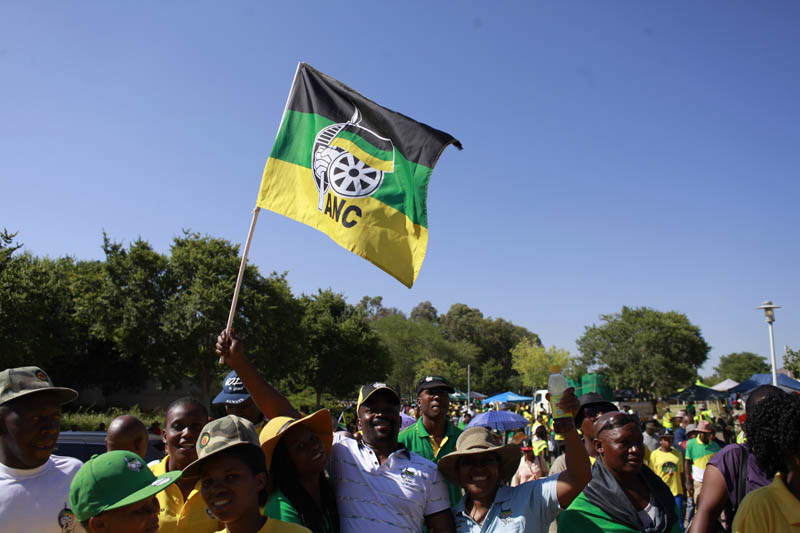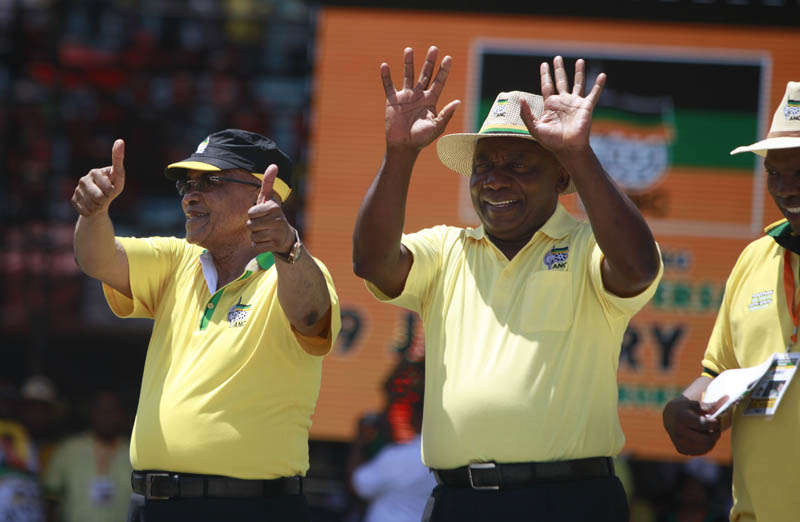Jacob Zuma was joined on stage by fellow ANC leaders.
President Jacob Zuma fired the first shot of the year in what looks set to be a heated local government elections battle.
He delivered his party’s traditional January 8 birthday statement to a half-full stadium in a sweltering Rustenburg on Saturday, where he took a swipe at the opposition by launching a veiled attack on the Democratic Alliance and the Economic Freedom Fighters, implying that they did not allow the ANC enough space to govern.
Both the DA and the EFF have been a thorn on Zuma’s side over the past few years. While the DA returned to court in an attempt to have corruption charges against him reinstated, the EFF has made his life difficult in Parliament, particularly about the controversial upgrades at his Nkandla homestead – which cost taxpayers over R200-million. Delivering his keynote, Zuma lambasted the media and opposition parties for trying to derail the ANC’s government.
“As we mark 104 years of this glorious movement, we emphasise that democracy and the democratic expression of the will of the majority must be protected by all citizens. We have noted the emerging tendencies to engage in low-intensity ‘law-fare’, which are attempts to divert the legitimate democratic outcomes in our country. It finds expression through various platforms, such as sections of the media, some analysts and commentators as well as continuous court challenges to the exercise of lawful executive and legislative power. The party that wins elections must be given space to govern. The ANC must be given space to govern. This is a fundamental basic principle of democracy and is practiced throughout the world,” said Zuma.
Racism row
Zuma spoke out on the issue of racism for the first time since a public debate erupted over a series of racist social media posts. The most prominent of this was by DA member Penny Sparrow, who complained about the amount of black people on a KwaZulu-Natal beach. The ANC laid charges against her for referring to black people as monkeys, among other things.
There are early indications that the ANC will use the anti-racism campaign as an elections strategy to counter the DA, which suspended Sparrow over her post, and which had to deal with MP Dianne Kohler-Barnard about her Facebook re-post last year, glorifying apartheid president PW Botha.
The ANC this week labelled as racist the DA’s jobs campaign poster with Zuma’s face. It was launched by DA leader Mmusi Maimane in Johannesburg this week as part of its local government campaign.
“It is clear that there is a tiny minority in our country that still harbours a desire for separate amenities and who idolise apartheid-era leaders who made our country the skunk of the world. These people do not represent the true character of the new South Africa. They are living in the past,” he said.
He said the ANC would work hard to eradicate racial exploitation in all its forms, including in the workplace, the education system, health sector, in the administration of justice and in access to government services and in the private sector.
The ANC president called on all its branches to develop specific campaigns against racism and to involve their communities, civil society and religious organisations in these campaigns.

Branch responsibility
Throughout his speech, Zuma returned to the theme of the ANC taking the lead to unify the country and to contribute to nation-building. “ANC branches must lead popular discussions on what makes us South African and, in this manner, branches must continue to be grounded in communities and give hope and leadership to our people,” he said.
Branch-level discussions must culminate in a national dialogue “on the issues that bind this wonderful nation on the one hand and to identify those that divide us and find solutions”. he said.
He also urged the ANC to develop campaigns “to further entrench our progressive value system among our people”.
He urged that ANC branches also get involved in developing a campaign to promote non-racialism throughout communities.
“ANC structures must work with all sectors of society in mainstreaming this campaign.”
This is set to go hand-in-hand with ongoing political education in the ANC.
Later Zuma urged that “communities must be vibrant, inclusive and democratic, and show respect for the diversity of life” in South Africa.
Local government elections
One of the topics Zuma covered in his speech most extensively was the local government elections campaign as well as the list processes for selecting councillor candidates – an issue which led to a lot of unhappiness and protests.
Zuma took time to explain that the party’s candidates for local government must be ANC members in good standing – previously an attempt to involve communities to help select ANC councilors led to the selection of people who were not even ANC members.
To deal with any ambiguity, Zuma explained the process in detail: “We remind branches that we select three nominees at an ANC branch meeting and present our nominees at a community meeting.”
The community then says who they want and the ANC confirms this candidate, “unless there are overwhelming and compelling reasons to the contrary”, Zuma said.
Municipal duty
Zuma then turned to governance in municipalities, saying “ANC structures and members must take the lead in making local government to function to create a better life for all”.
He urged ANC public representatives to have “a dynamic and interactive relationship with their communities” – absent councilors have been a problem in the past.
He highlighted the ANC’s satisfaction with progress in “many areas in our country”, which has improved “the lives of millions”.
There are still challenges as well, he said. “The ANC remains fully aware of the challenges facing our people and appreciates that people need water, electricity, housing, roads and decent schools near their homes,” he said.
To address that, the party was championing the government’s Back to Basics programme.
He called on the ANC to campaign for a local government elections victory, and he called on young people to help with this and to go out and vote.

#FeesMustFall
Zuma also devoted a large portion of the speech to an issue that could cast the ANC in a negative light if it isn’t dealt with.
In a move calculated to neutralise #FeesMustFall protests, Zuma pledged an additional R4.5-billion rand to student financial aid scheme NSFAS for the 2016/17 financial year which will go towards assisting financially needy students on top of the R2.6-billion that was reprioritised to ensure the zero percent fee increase this year.
During Friday night’s gala dinner he said the government was planning to establish a commission that would look at the promotion of access to higher education. It is expected that the #FeesMustFall movement will gain momentum in the coming weeks as the university registration period approaches.
Zuma also condemned the violence that was associated with the protests, saying that although students have a right to protest, property damage and disruption of academic schedules undermines the students’ campaign. However, he did not condemn the violence of the police and private security that was hired by universities during the protests. The peak of police violence towards students was in Cape Town when students interrupted the budget speech in Parliament. Excessive use of violence was also seen at many historically black institutions such as the University of the Western Cape and Fort Hare University.